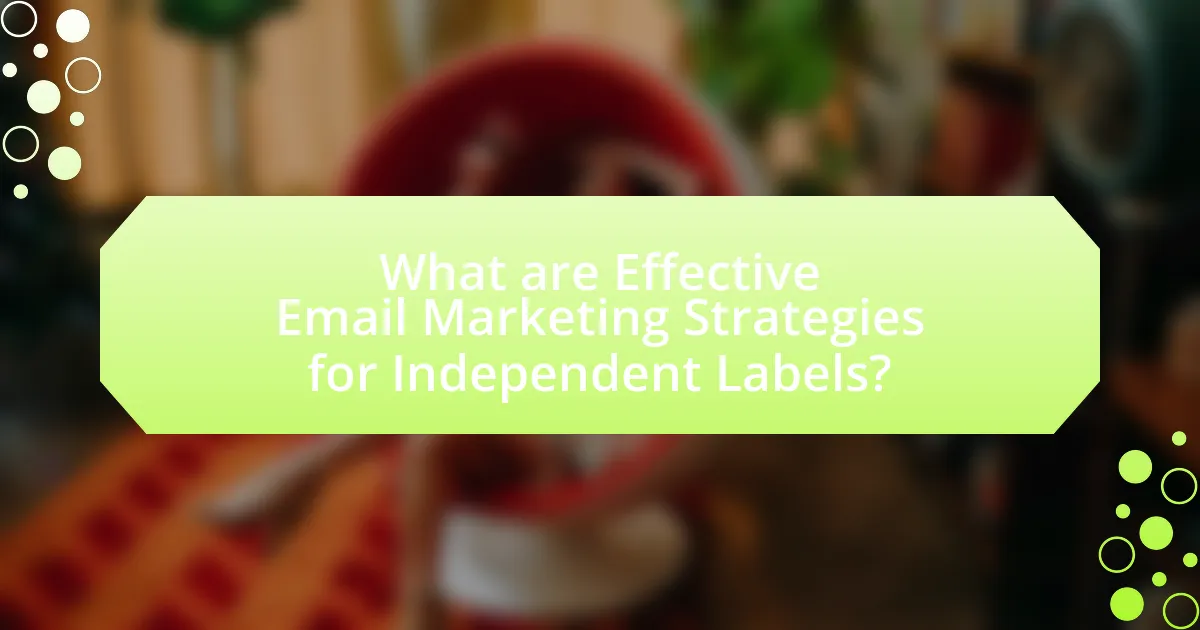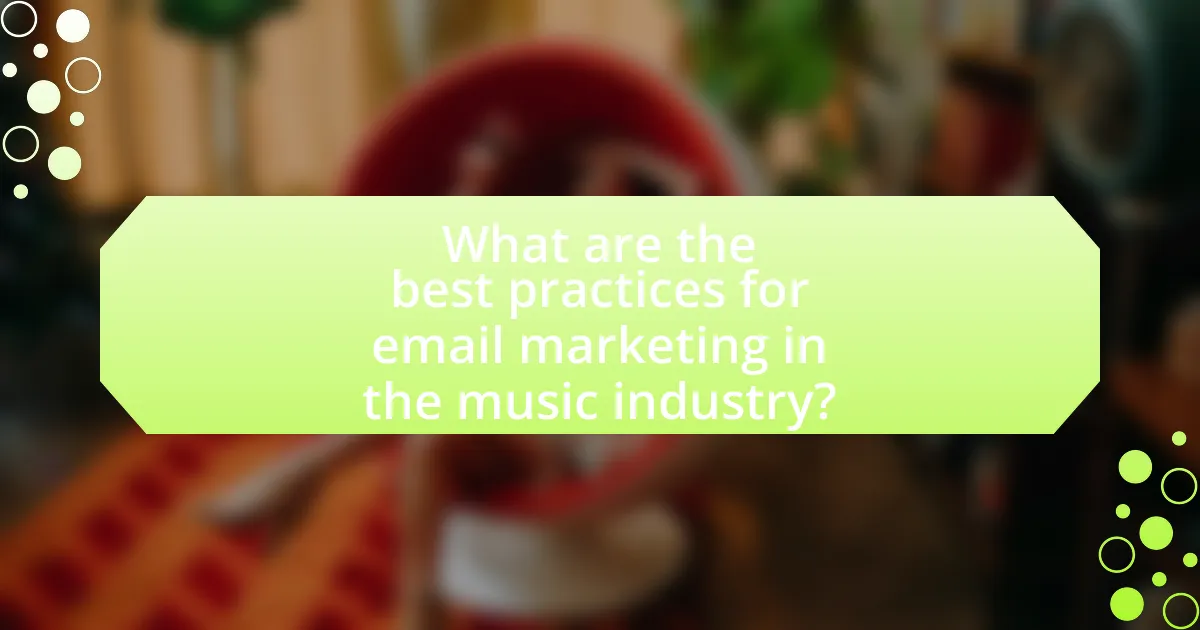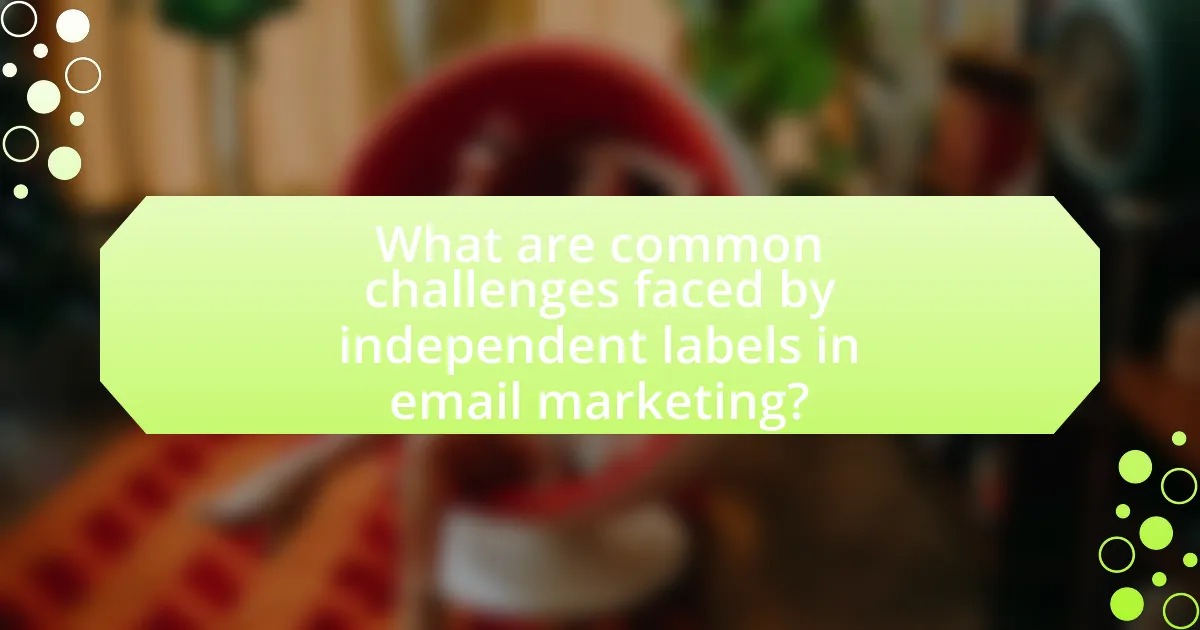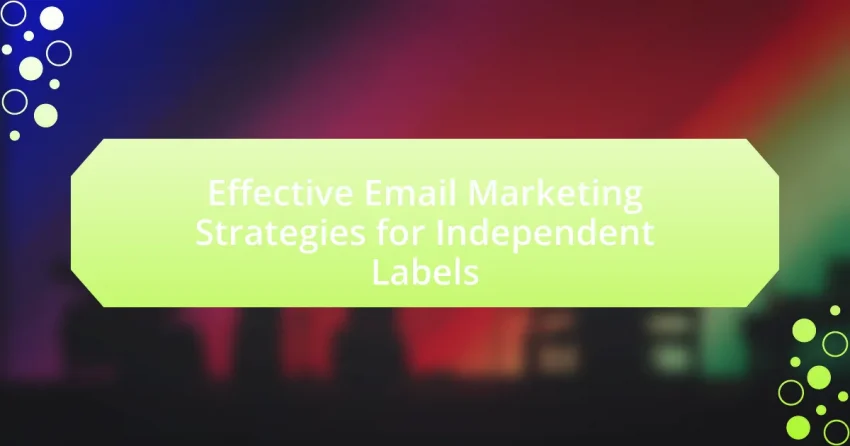Effective email marketing strategies for independent labels focus on building targeted email lists, creating engaging content, and analyzing performance metrics. Key components include segmenting audiences based on preferences, delivering personalized messages, and utilizing exclusive content to enhance subscriber engagement. The article highlights the importance of compliance with legal regulations, such as the CAN-SPAM Act and GDPR, while also addressing common challenges faced by independent labels, such as limited budgets and low open rates. Best practices for successful email marketing, including optimizing for mobile devices and utilizing analytics, are also discussed to help independent labels foster loyalty and drive sales in a competitive music industry.

What are Effective Email Marketing Strategies for Independent Labels?
Effective email marketing strategies for independent labels include building a targeted email list, creating engaging content, and analyzing performance metrics. Independent labels should focus on collecting email addresses through website sign-ups, social media promotions, and live events to ensure a relevant audience. Engaging content, such as exclusive releases, behind-the-scenes insights, and personalized messages, fosters a connection with subscribers. Additionally, analyzing metrics like open rates and click-through rates helps refine strategies, ensuring that campaigns resonate with the audience. According to a study by Campaign Monitor, personalized emails can generate six times higher transaction rates, highlighting the importance of tailored content in email marketing.
How can independent labels leverage email marketing effectively?
Independent labels can leverage email marketing effectively by building targeted email lists and creating engaging content that resonates with their audience. By segmenting their audience based on preferences and behaviors, independent labels can tailor their messages, leading to higher open and click-through rates. According to a study by Mailchimp, segmented campaigns can result in a 14.31% higher open rate compared to non-segmented campaigns. Additionally, incorporating exclusive content, such as early access to new releases or behind-the-scenes insights, can enhance subscriber engagement and loyalty. This approach not only fosters a stronger connection with fans but also drives sales and promotes upcoming events, ultimately contributing to the label’s growth and visibility in a competitive market.
What are the key components of a successful email marketing campaign for independent labels?
The key components of a successful email marketing campaign for independent labels include a targeted email list, engaging content, a clear call to action, and performance analytics. A targeted email list ensures that messages reach individuals who are genuinely interested in the label’s music, which can increase open and click-through rates. Engaging content, such as exclusive updates, behind-the-scenes stories, and personalized recommendations, keeps subscribers interested and encourages them to interact with the emails. A clear call to action guides recipients on what to do next, whether it’s streaming a new release or purchasing merchandise. Finally, performance analytics allow independent labels to track the effectiveness of their campaigns, enabling them to refine their strategies based on metrics like open rates and conversions. These components collectively enhance the effectiveness of email marketing efforts for independent labels.
How do independent labels define their target audience for email marketing?
Independent labels define their target audience for email marketing by analyzing demographic data, engagement metrics, and music preferences. They utilize tools like surveys and social media analytics to gather insights on age, location, and listening habits, which helps in segmenting their audience effectively. For instance, a study by the International Music Summit in 2021 highlighted that 70% of independent labels reported using audience analytics to tailor their marketing strategies, ensuring that their email campaigns resonate with specific listener groups. This targeted approach increases engagement rates and fosters a stronger connection with fans.
Why is email marketing important for independent labels?
Email marketing is important for independent labels because it allows them to build direct relationships with their audience and promote their music effectively. By utilizing email marketing, independent labels can reach their fans with targeted messages, updates, and exclusive content, which fosters loyalty and engagement. According to a study by the Direct Marketing Association, email marketing has an average return on investment of $42 for every dollar spent, highlighting its effectiveness in driving sales and engagement. This direct communication channel is crucial for independent labels that may lack the marketing budgets of larger companies, enabling them to compete effectively in the music industry.
What advantages does email marketing provide over other marketing channels?
Email marketing offers several advantages over other marketing channels, primarily its cost-effectiveness, direct audience engagement, and measurable results. It allows businesses to reach a targeted audience with personalized messages, leading to higher conversion rates. According to the Data & Marketing Association, email marketing has an average return on investment (ROI) of $42 for every dollar spent, making it one of the most profitable marketing channels. Additionally, email marketing enables brands to build and maintain relationships with customers through regular communication, fostering loyalty and repeat business. The ability to track metrics such as open rates, click-through rates, and conversions further enhances its effectiveness, allowing marketers to optimize their strategies based on real-time data.
How does email marketing contribute to building a loyal fanbase for independent labels?
Email marketing contributes to building a loyal fanbase for independent labels by enabling direct communication and personalized engagement with fans. This strategy allows labels to share exclusive content, updates, and promotions tailored to their audience’s preferences, fostering a sense of community and belonging. According to a study by Campaign Monitor, email marketing has an average ROI of 4400%, indicating its effectiveness in driving engagement and loyalty. By consistently delivering valuable content through email, independent labels can strengthen relationships with their fans, leading to increased retention and support for their artists.

What are the best practices for email marketing in the music industry?
The best practices for email marketing in the music industry include segmenting your audience, personalizing content, and optimizing for mobile devices. Segmenting allows for targeted messaging, which can increase engagement rates; for instance, a study by Mailchimp found that segmented campaigns have an average open rate of 14.32% higher than non-segmented ones. Personalization, such as addressing subscribers by name or tailoring content based on their preferences, can significantly enhance user experience and retention. Additionally, with over 50% of emails being opened on mobile devices, ensuring that emails are mobile-friendly is crucial for maximizing reach and effectiveness. These strategies collectively contribute to higher engagement and conversion rates in email marketing for the music industry.
How can independent labels create engaging email content?
Independent labels can create engaging email content by personalizing messages, utilizing compelling visuals, and incorporating interactive elements. Personalization increases open rates by 26%, as tailored content resonates more with recipients. Compelling visuals, such as high-quality images or videos, enhance engagement, with studies showing that emails with visuals can increase click-through rates by up to 42%. Additionally, incorporating interactive elements like polls or quizzes can boost engagement, as interactive content generates 2 to 3 times more conversions than static content.
What types of content resonate most with fans in email newsletters?
Engaging content types that resonate most with fans in email newsletters include exclusive updates, behind-the-scenes insights, personalized recommendations, and interactive elements such as polls or surveys. Exclusive updates keep fans informed about new releases, events, or merchandise, fostering a sense of belonging. Behind-the-scenes insights provide a deeper connection to the artists, enhancing fan loyalty. Personalized recommendations based on previous interactions increase relevance and engagement, while interactive elements encourage participation and feedback, making fans feel valued. Research indicates that newsletters with personalized content can achieve open rates of up to 29% higher than generic ones, demonstrating the effectiveness of tailored communication in building fan relationships.
How often should independent labels send emails to their subscribers?
Independent labels should send emails to their subscribers approximately once a week. This frequency helps maintain engagement without overwhelming subscribers, as research indicates that weekly emails can lead to higher open rates and lower unsubscribe rates. According to a study by Mailchimp, emails sent weekly achieve an average open rate of 21.33%, compared to lower rates for less frequent communications. Therefore, a weekly schedule is optimal for fostering a consistent connection with subscribers while maximizing engagement.
What tools and platforms are recommended for email marketing?
Mailchimp, Constant Contact, and Sendinblue are recommended tools and platforms for email marketing. Mailchimp offers user-friendly design templates and robust analytics, making it suitable for beginners and experienced marketers alike. Constant Contact provides excellent customer support and a wide range of integrations, which enhances its usability for small businesses. Sendinblue stands out with its SMS marketing capabilities and advanced automation features, catering to diverse marketing needs. These platforms are widely recognized in the industry, with Mailchimp serving over 14 million users, Constant Contact boasting a 97% customer satisfaction rate, and Sendinblue being a leader in transactional email services.
Which email marketing platforms are best suited for independent labels?
Mailchimp, ConvertKit, and Sendinblue are the best email marketing platforms suited for independent labels. Mailchimp offers a user-friendly interface and robust analytics, making it ideal for small businesses and independent artists to track engagement. ConvertKit specializes in automation and segmentation, allowing independent labels to tailor their messaging effectively to different audience segments. Sendinblue provides cost-effective pricing and SMS marketing capabilities, which can enhance communication strategies for independent labels. These platforms collectively support the unique needs of independent labels by providing essential tools for audience engagement and marketing efficiency.
How can independent labels utilize analytics to improve their email campaigns?
Independent labels can utilize analytics to improve their email campaigns by tracking key performance indicators (KPIs) such as open rates, click-through rates, and conversion rates. By analyzing these metrics, labels can identify which content resonates with their audience, allowing them to tailor future emails to better meet subscriber preferences. For instance, a study by Mailchimp found that segmented email campaigns can lead to a 14.31% higher open rate compared to non-segmented campaigns. This data-driven approach enables independent labels to optimize their messaging, timing, and frequency, ultimately enhancing engagement and driving sales.

What are common challenges faced by independent labels in email marketing?
Independent labels face several common challenges in email marketing, including limited budgets, lack of resources, and difficulties in building and maintaining a subscriber list. Limited budgets restrict their ability to invest in advanced marketing tools and professional services, which can hinder campaign effectiveness. Additionally, many independent labels lack dedicated marketing teams, making it challenging to create consistent and engaging content. Furthermore, building a subscriber list is often difficult due to competition and the need for effective lead generation strategies. According to a study by Mailchimp, smaller businesses experience lower open and click rates compared to larger companies, highlighting the struggle independent labels face in capturing audience attention.
How can independent labels overcome low open and click-through rates?
Independent labels can overcome low open and click-through rates by segmenting their email lists and personalizing content for specific audience groups. This targeted approach increases relevance, leading to higher engagement; for instance, studies show that personalized emails can improve click-through rates by up to 14% and conversion rates by 10%. Additionally, optimizing subject lines and sending times based on audience behavior can further enhance open rates, as research indicates that 33% of email recipients open emails based on the subject line alone.
What strategies can be implemented to improve email deliverability?
To improve email deliverability, independent labels should implement strategies such as maintaining a clean email list, using double opt-in for subscriptions, and authenticating emails with SPF, DKIM, and DMARC protocols. A clean email list reduces bounce rates and spam complaints, which are critical for maintaining a good sender reputation. Double opt-in ensures that subscribers genuinely want to receive emails, further decreasing the likelihood of being marked as spam. Email authentication protocols like SPF, DKIM, and DMARC help verify the sender’s identity, which enhances trust with email service providers and improves deliverability rates. According to a study by Return Path, emails that are authenticated have a 99% higher chance of being delivered to the inbox compared to unauthenticated emails.
How can independent labels effectively segment their email lists?
Independent labels can effectively segment their email lists by categorizing subscribers based on specific criteria such as demographics, purchase history, engagement levels, and music preferences. This targeted approach allows labels to tailor their messaging and promotions to different audience segments, enhancing engagement and conversion rates. For instance, a study by Mailchimp found that segmented campaigns can lead to a 14.31% higher open rate compared to non-segmented campaigns, demonstrating the effectiveness of this strategy in improving communication with fans.
What are the legal considerations for email marketing in the music industry?
Legal considerations for email marketing in the music industry include compliance with the CAN-SPAM Act, obtaining explicit consent from recipients, and ensuring accurate sender information. The CAN-SPAM Act mandates that marketers must provide a clear opt-out mechanism, honor opt-out requests promptly, and include a physical address in emails. Additionally, the General Data Protection Regulation (GDPR) applies to any marketing targeting EU citizens, requiring explicit consent and the ability for users to withdraw consent easily. Violating these regulations can result in significant fines, as evidenced by the Federal Trade Commission’s enforcement actions against non-compliant companies.
What regulations must independent labels comply with when sending marketing emails?
Independent labels must comply with the CAN-SPAM Act when sending marketing emails in the United States. This regulation requires that emails include a clear opt-out mechanism, accurate sender information, and a truthful subject line. Additionally, independent labels must honor opt-out requests promptly and include their physical mailing address in the email. The Federal Trade Commission enforces these regulations, which aim to protect consumers from deceptive practices in email marketing.
How can independent labels ensure they are following best practices for consent and privacy?
Independent labels can ensure they are following best practices for consent and privacy by implementing clear opt-in processes for email subscriptions. This involves obtaining explicit permission from individuals before sending marketing communications, which aligns with regulations such as the General Data Protection Regulation (GDPR) and the CAN-SPAM Act.
Additionally, independent labels should provide transparent information about how personal data will be used, stored, and shared, ensuring compliance with privacy laws. Regularly reviewing and updating privacy policies, as well as offering easy opt-out options for subscribers, further reinforces adherence to best practices. According to a study by the Direct Marketing Association, 73% of consumers prefer brands that respect their privacy, highlighting the importance of these practices in maintaining trust and engagement.
What practical tips can independent labels implement for successful email marketing?
Independent labels can implement several practical tips for successful email marketing, including segmenting their audience, personalizing content, and optimizing for mobile devices. Segmenting the audience allows labels to tailor messages based on listener preferences, which can increase engagement rates; for instance, a study by Mailchimp found that segmented campaigns have an open rate of 14.32% higher than non-segmented ones. Personalizing content, such as using the recipient’s name and recommending music based on past purchases, can enhance the connection with fans, as personalized emails can lead to a 26% increase in open rates according to Campaign Monitor. Additionally, optimizing emails for mobile devices is crucial, as over 50% of emails are opened on mobile, and responsive design can improve user experience and click-through rates.
